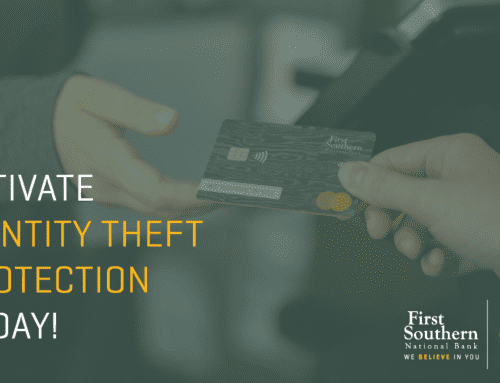Each year, millions of seniors fall victim to financial fraud or schemes. However, it is estimated that only one in 44 senior scam victims report their victimization. Fraudsters use many tactics to scam, but there are also many red flags to watch out for.

RED FLAGS
If it sounds too good to be true, it probably is. If someone is offering you something for free or a prize you never registered to win, it is likely a scam.
High-pressure or time-sensitive. Scammers prey on fear and want to scare you into taking action quickly. Don’t allow yourself to be pressured into acting immediately, and take the time to talk to someone you trust and independently verify the information.
Pay money upfront or by wire transfer. Legitimate businesses and government agencies will not threaten you for upfront payments or payments by wire. Never pay someone who insists payments be made in gift cards. Also, if someone asks you to deposit a check and send money back to them, it is a scam.
COMMON SCAMS
Here are a few of the top scams impacting seniors across Kentucky and the United States.
MEDICARE SCAMS
With Medicare scams, a fraudster claims to represent Medicare and asks for the victim’s sensitive information. They then use it to bill Medicare for services never provided. In a similar scam, scammers will advertise or provide medical services that are fraudulent and then bill Medicare to cover it.
What you should do: Hang up as Medicare will never contact you in this way.
GRANDPARENT SCAMS
In this scam, scammers pose as a frantic grandchild, friend of your grandchild or lawyer representing your grandchild. The scammer will claim that your grandchild has been arrested for a crime and request that you send funds via wire transfer, pre-paid credit cards or gift cards. The scammer often pleads with the grandparent not to tell anyone. Scammers take advantage of seniors’ love and concern for their families by preying on their good nature.
What you should do: Hang up and contact your grandchild’s parent or your grandchild directly to ensure they are safe.
COMPUTER TECH SUPPORT
Technical support scammers claim to provide computer support for a virus that has been detected, and they request remote access to your computer to remove it. These scammers then lock your computer and demand money to restore access to your device.
Scammers may also use a pop-up box warning you of a technical issue and provide a phone number to call. Once you make contact, the scammer will request remote access to your computer and ask you to open banking websites and other sites that contain personal information.
What you should do: Never call a technical support company based on a number provided in a pop-up box. It is best to obtain support phone numbers directly from a legitimate company’s website. Legitimate companies like Microsoft will not call consumers in this manner or use pop-up boxes.
ROMANCE SCAMS
Romance scammers create fake profiles on dating sites or apps and develop relationships with their targets by messaging them through social media sites. Soon after developing a relationship and trust, they fabricate a story and ask for money. By claiming that they’re living or traveling outside the United States, these scammers will request wire transfers, gift cards or pre-paid credit cards for plane tickets, travel expenses, medical expenses, customs fees, gambling debts or visas and official travel documents.
What you should do: The best way to avoid becoming a victim of a romance scam is to meet potential love interests in person and be suspicious of any online contact whom you haven’t met that asks for money.
LOTTERY & SWEEPSTAKES SCAMS
Lottery and Sweepstakes scammers call victims to announce lottery winnings or Publisher’s Clearing House prizes and request payment for taxes and fees to obtain winnings.
What you should do: If you receive a call from someone claiming to be Publisher’s Clearing House, hang up immediately. Publisher’s Clearing House does not contact winners by phone. Remember, it is illegal for any sweepstakes promoter to request upfront fees.
IDENTITY THEFT
Identity theft occurs when someone uses personal information or a Social Security number to open credit accounts, take out loans, apply for utilities or government benefits, or file taxes without consent or knowledge.
What you should do: If you suspect your identity has been compromised, we urge you to take action immediately. To learn more about identity theft and what to do if your identity has been compromised, visit here.
DEBT COLLECTOR / IRS SCAMS
A scammer contacts the victim claiming to be a debt collector or representative of the IRS who needs to collect money owed by the victim or their loved one. In another version of the scam, a fraudster reaches out to the family members of someone who recently passed away and claims that they are now liable for their debts.
What you should do: Hang up and contact your family member or loved one and always seek legal advice when possible. This tool can help you if you are legitimately being contacted by a debt collector and walk you through the most important information that you need to know and help you make a plan for how to move forward.
By staying informed and watching for red flags, you can save yourself and those you care about from the emotional and financial distress caused by fraud. The Office of the Attorney General provides Consumer Alerts to help protect individuals. You can sign up to receive these alerts by email.
If you are a scam victim or have encountered a potential scam, you must act quickly. Seniors who help report scams can help protect others and themselves from further financial harm. Kentuckians should report scams to the Office of the Attorney General at 888-432-9257 or file a scam complaint online.



